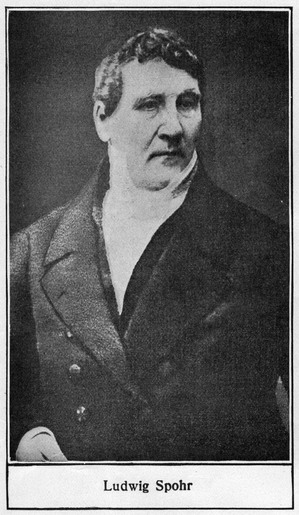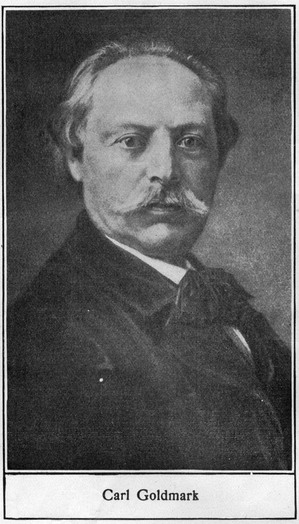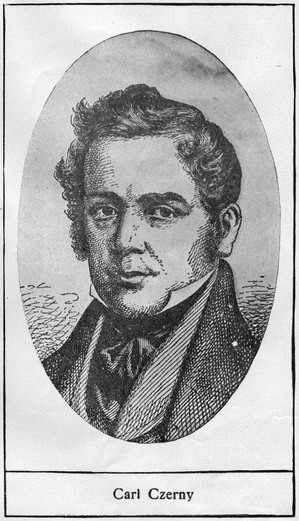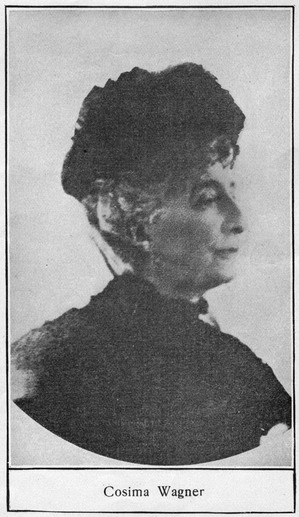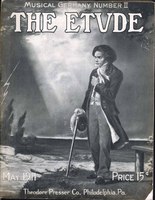Spohr was born at Brunswick, April 5, 1784, and died at Cassel, November 22, 1859. He played the violin when he was five, and for a time studied with Kunisch, of the Duke’s orchestra. Thanks to the assistance of the Duke, he was able to study with Franz Eck in 1802-3, with whom he subsequently went on tour. He was also much influenced by Rode, the French violinist. His musical career was spent at Gotha (1805), where he met his wife; at Vienna (1812-15), where he met and severely criticised Beethoven; Frankfort (1817), where he introduced conducting with a baton, and finally at Cassel (1822-57), where he was Court Capellmeister. He also toured Germany, Holland and Italy. In 1820 he visited England, and speedily became immensely popular as a virtuoso, conductor and composer. He produced over 160 works, including 11 operas, 4 oratorios, 9 symphonies, 15 violin concerts, and other works in all forms. Of all these only two of the oratorios, The Last Judgment and Calvary, and three or four of the violin concertos retain any popularity. As a violinist he ranks among the greatest of all time. He played with great breadth and beauty of tone. Spohr’s Violin School is still popular among advanced violin students. It is noteworthy that Spohr was among the first to champion the cause of Wagner.
Goldmark was born at Keszthely, Hungary, May 18, 1830, and is of Jewish descent. He evinced musical talent at an early age, and in 1844 went to Vienna, where he became a pupil of Leopold Jansa. In 1847 he entered the Conservatorium and studied with Böhm (violin) and Preyer (harmony). In 1848 the institution was closed owing to political disturbances and Goldmark had to fend for himself. He obtained a position in a theatre orchestra in Raab, and when that town was captured by the government troops he was arrested as a rebel, and would have been shot had not a friend come to his rescue with an explanation. He returned to Vienna in 1850, and worked hard at orchestration and similar studies, gradually winning recognition as a composer. Goldmark spent two years in Pesth, but returned to Vienna in 1860 to give piano lessons. He has remained in Vienna ever since. His Sakuntala overture was produced at a Philharmonic concert in Vienna in 1865, and was greatly liked. This work, the overture, Sappho, and the Country Wedding Symphony are his best-known orchestral compositions. His chief opera is his first, The Queen of Sheba. He has, nevertheless, written excellent works in all forms, and is admittedly one of the foremost living composers. His works are remarkable for their warmth of orchestral and harmonic coloring, and for the richness of their melodies.
Czerny was born February 20, 1791, at Vienna, and died there July 15, 1857. His father was his first teacher, but subsequently Beethoven instructed him, and the great composer was much impressed with the boy’s talent. Czerny made many friends, including Prince Lichnowsky, Beethoven’s patron, and the pianists Hummel and Clementi. He was to have gone on tour in 1804, but Napoleon was interfering with the peace of Europe at that time, and the idea was given up. Subsequently he only left Vienna three times, visiting Leipsic in 1836, Paris and London in 1837, and Lombardy in 1846. He was soon immensely popular as a teacher in Vienna, and was able to refuse all pupils save those who showed exceptional talent. His first work as a composer consisted of Twenty Concert Variations, and this was so popular that he was fairly besieged by publishers. His industry, both as teacher and composer, was enormous, and he produced over 1,000 published works, of which many single numbers consisted of fifty or more pieces. The most famous of his pupils were Franz Liszt, Döhler, Thalberg and Jaell. Leschetizky also studied with Czerny, and in popularity as a teacher seems to be his natural successor in Vienna. Czerny’s technical studies are found wherever the piano is taught, and his influence on piano study is uncalculable.
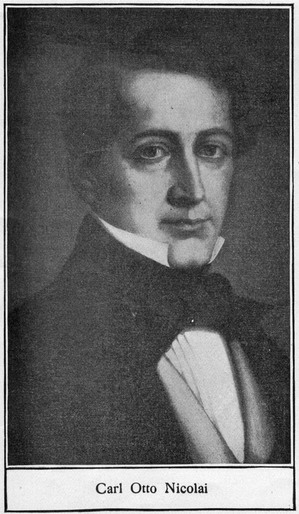 CARL OTTO EHRENFRIED NICOLAI.
CARL OTTO EHRENFRIED NICOLAI.
(Nik’-o-lye.)
Nicolai was born at Königsberg, June 9, 1810, and died May 11, 1849, at Berlin. His youth was unhappy, though he was well instructed in piano playing, and in his sixteenth year he ran away. He was befriended by a man named Adler, who subsequently sent him to Berlin (1827), where he studied with Klein, and also with the teacher of Mendelssohn, Zelter. From 1833 to 1837 he was organist at the Prussian Embassy in Rome. He then visited Vienna, where after another short sojourn in Rome he produced many of his light operas. In 1841 he was appointed Capellmeister at the Vienna opera, where his services were much appreciated. While in Vienna he founded the Philharmonic concerts for the purpose of giving adequate performances of the Beethoven symphonies. On April 1, 1847, Nicolai gave a farewell concert in Vienna at which Jenny Lind assisted in the production of some of the numbers from his opera. The Merry Wives of Windsor, then in course of preparation. He was appointed director of the Domchor in Berlin, and also Court Capellmeister at the opera. His famous opera. The Merry Wives, was produced on March 9, 1849, two days before he died. The work was immensely popular, and the overture is still a great favorite, on account of its tunefulness and great beauty.
Cosima Wagner was born December 25, 1841, and is the daughter of Franz Liszt. Much of her early life was spent with Liszt’s mother, but eventually she went to live with the mother of Hans von Bülow. The chief interest in her career, however, rests in the marvelous influence she exerted over Richard Wagner. After the death of Wagner’s first wife, Minna (née Planer), Cosima von Bülow—as she then was—and Richard Wagner were married. The marriage proved to be one of the happiest in the history of music. The great composer and his wife lived an ideal life at their home, ”Wahnfried,” Bayreuth, which soon became the center of a musical côterie that has become famous throughout the musical world. One child was born of the marriage—Siegfried Richard Wagner. He was born at Triebschen, June 6, 1869. In honor of this event his father composed the Siegfried Idyl in which he portrays his happiness with consummate mastery. Since the death of Richard Wagner, Cosima and her son have continued to reside at Wahnfried, where they have superintended the Bayreuth festivals. The Wagner régime at Bayreuth has not escaped criticism, but the imperious daughter of Franz Liszt has permitted no interference in the administration of what she believes to have been Wagner’s own plans.
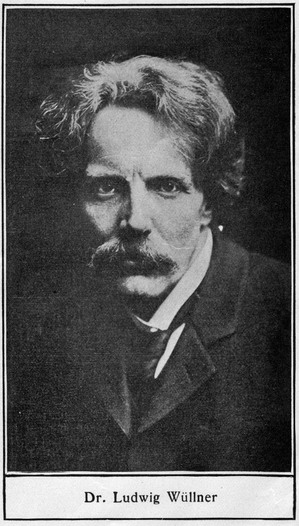 DR. LUDWIG WÜLLNER.
DR. LUDWIG WÜLLNER.
(Pronounced nearly Veel’-ner.)
Dr. Wüllner was born at Münster, August 19, 1858, and enjoys the distinction of being the distinguished son of a distinguished father—Franz Wüllner, the successor of von Bülow at the Court Theatre in Munich, and of Hiller at the Cologne Conservatory. Dr. Ludwig Wüllner was a student of philology and kindred subjects at Munich, Strasburg and Berlin, and became a teacher in the Münster Academy in 1884, after taking the Doctor’s degree. In 1887 he gave up his position to study at the Cologne Conservatory, and two years later went on the stage at Meiningen. His great histrionic ability speedily brought him to the fore, and in 1895 he gave up regular stage work in order to become a reciter. The following year he surprised his many friends by becoming a singer. For a long time there has been a great deal of discussion as to whether Dr. Wüllner really can sing, and he is sometimes referred to as “the singer without a voice.” Meanwhile Dr. Wüllner goes serenely on drawing huge audiences in Europe and in America, for he certainly presents the great German lieder in a way accomplished by no one else living. The force of his personal magnetism, and his unquestioned dramatic ability, combined with his clearness of enunciation, are no doubt largely responsible for his success.


